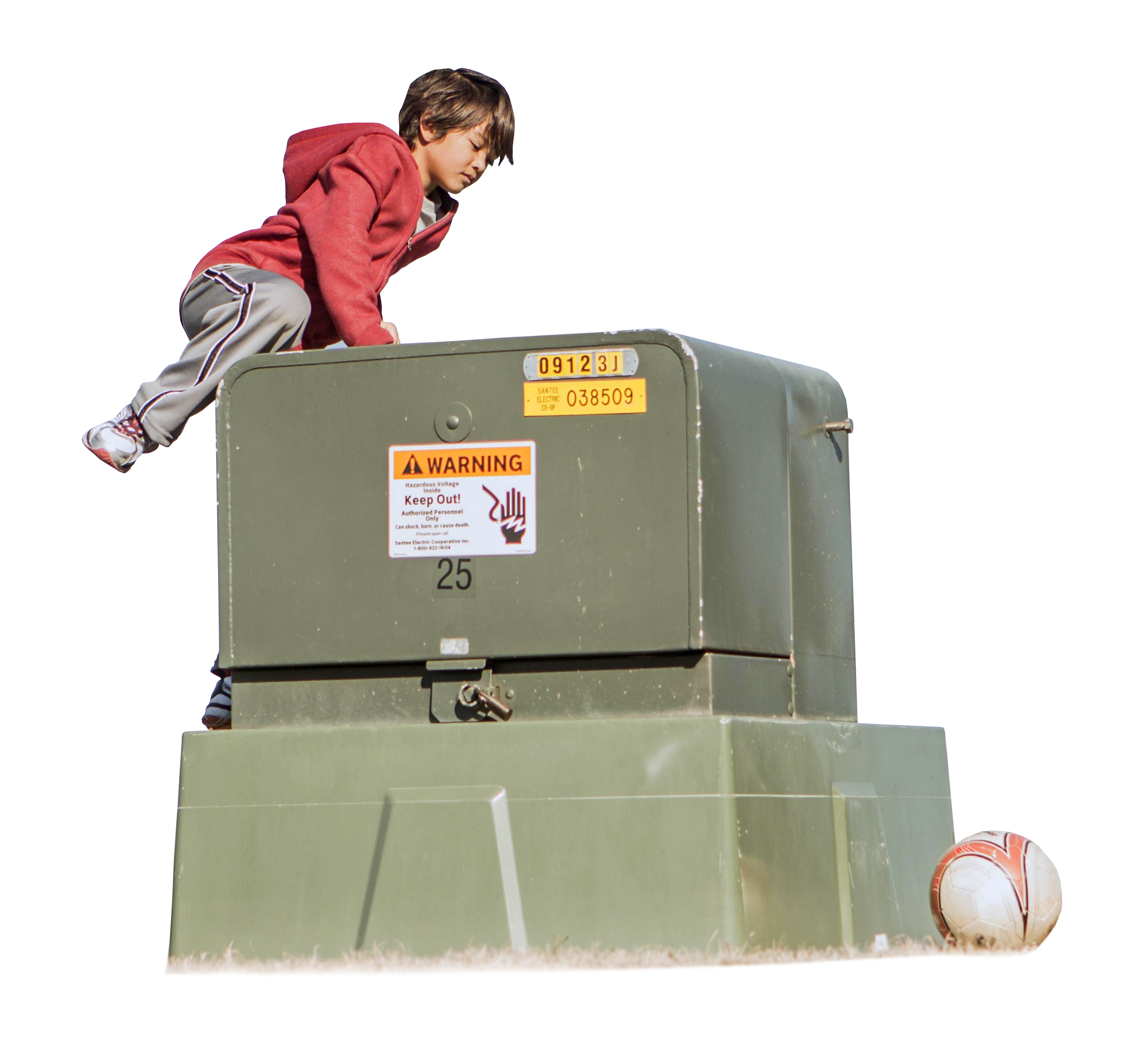Always Look Up
While REC installs some power lines underground, the majority of the Cooperative's power lines are overhead, running through neighborhoods and yards to your home. Familiarize yourself with the location of power lines in the area you will be working.
If you are planning to take down or prune a tree near overhead power lines, contact REC to request a review of the situation to ensure that it is safe for you to complete the work. If the tree is too close to overhead lines, professional line clearance tree trimmers should perform the work.
Keep ladders and other tools clear of power lines when completing projects such as gutter cleaning.
 Follow these safety tips when around power lines and power line equipment:
Follow these safety tips when around power lines and power line equipment:
- If an overhead line falls on your car, know that you are safe as long as you stay inside the car. If you must exit the car, jump, being careful not to touch the car and ground at the same time.
- A tree trimmer, metal ladder or other object can extend your reach dangerously close to power lines. Never trim or remove trees near overhead lines. Avoid planting new trees where they might grow into an overhead line.
- Teach your children never to climb trees near overhead lines and to be aware of the danger posed by those power lines.
- Never let children play or climb on the big "green box" in your yard. Known as pad-mount transformers, they are extremely dangerous and should always be locked.
- Always fly kites and model airplanes away from overhead lines. If a kite or model airplane gets caught in an overhead line, never attempt to retrieve it. Call REC to remove it.
- If you see a broken or fallen overhead power line, assume it's "live" and call REC immediately.
- Know that utility poles and fences around electric substations and transformers on the ground are "off limits" to everyone.
Safe Farming
Important Steps to Take:
- Use a spotter when operating large machinery near lines.
- Keep equipment at least 10 feet from lines—at all times, in all directions.
- Look up and use care when raising any equipment such as ladders, front-end loaders, or augers.
- Inspect the height of the farm equipment to determine clearance.
- Remember, even non-metallic materials such as lumber, tree limbs, tires, ropes and hay will conduct electricity depending on dampness, dust and dirt contamination.
- Use caution when handling long items such as irrigation pipe, ladders and rods. Coming too close to a power line can cause electricity to arc, or “jump,” to conducting material or objects.
- Always remember to lower extensions to the lowest setting when moving loads.
- Never attempt to move a power line out of the way or raise it for clearance.
- If a power line is sagging or low, call REC at 800-552-3904.
IF YOU CONTACT A POWER LINE:
- STAY PUT
- If your equipment contacts a power line, stay inside the cab. DO NOT EXIT.
- Call 911 and your electric cooperative for help and warn anyone nearby not to approach your equipment.
- Only exit the machinery after you are told by the authorities that it is safe to do so.
- Exiting equipment that has contacted energized power lines can cause electrocution.
- The downed power lines could be charging the equipment with electricity and, if you step out, you will become the electricity’s path to the ground and could be killed by electric shock.
- JUMP CLEAR
- If you must get out of your equipment because of a fire, tuck your arms across your body and jump with your feet together as far as possible from the equipment so no part of your body touches the equipment and the ground at the same time.
- Move away from the equipment with your feet together, either by hopping or shuffling, until you are at least 40 feet away. Electricity spreads through the ground in ripples. Keeping your feet together prevents one foot from stepping into a higher voltage zone than the other foot, which could cause electrocution.
- STAY AWAY
- When you are clear of the area, call for help and keep others away.
- DO NOT approach your vehicle again until utility crews and emergency responders tell you it is safe.
Attaching Signs to Poles
Putting signs or other items on utility poles creates serious safety hazards. Staples, nails and tacks used to hang signs - as well as the signs themselves - pose dangers to REC's linemen who climb poles when restoring power following storms or while performing routine maintenance to ensure system reliability. Nails and tacks left behind from signs can snag utility workers' boots or puncture safety clothing, making linemen vulnerable to slipping or even electrocution.
Hunters Be Careful
Shooting at utility facilities — wires, poles and insulators — is dangerous, jeopardizes everyone’s power and is a felony in Virginia.
Never attempt to shoot through wires or at anything that may be on the wires or poles.
Gunshot damage to electric equipment can cause an electrical arc or cause wires to fall, with a high risk of serious injury or death.


